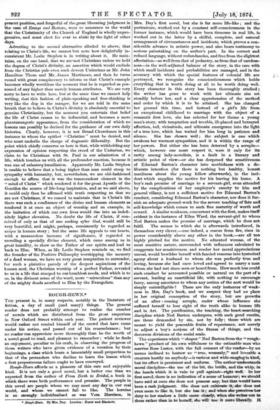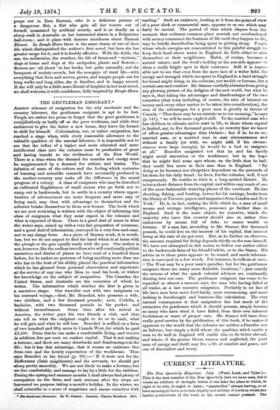ROUGH-HEWN.*
THE present is, in many respects, notably in the literature of fiction, a day of small (and many) things. The general reader does not probably attempt to realise the number of novels which are distributed from the gnat emporium in New Oxford Street within each year. The patient reviewer would rather not remind himself of the crowd that have come under his notice, and passed out of his remembrance ; but no reader can appreciate more thoroughly than he the worth of a novel good to read, and pleasant to remember ; while he finds an enjoyment, peculiar to his craft, in observing the progress of those writers who have given evidence of a vocation by their beginnings, a class which bears a lamentably small proportion to that of the pretenders who decline to learn the lesson which a first preposterous failure ought to have conveyed. Rough-Hewn affords us a pleasure of this rare and enjoyable kind. It is not only a good novel, but a better one than we expected from the author of From Birth to Bridal, a book in which there were both performance and promise. The people in this novel are people whom we may meet any day in our real -world, and whom we cannot fail to like. The heroine is as strongly individualised as was Vera Harrison, in * Itbugh-ilewn. By Mrs. Day. London : Hurst and }Hackett. Mrs. Day's first novel, but she is far more life-like ; and the' portraiture, worked out by a constant self-consciousness in the former instance, which would have been tiresome in real life, is worked out in the latter by a skilful, complete, and natural arrangement of circumstances and incidents, which proves a con- siderable advance in artistic power, and also bears testimony to- serious painstaking on the author's part. In the correct and refined language, without redundancies, and free from the slightest affectation—as well from that of pedantry, as from that of careless- ness—in the well-adfusted balance of the story, in the care with which small incidents and probabilities are managed, and in the
• with which the special features of colonial life are
portrayed, we recognise the conscientiousness which holds everything that is worth doing at all to be worth doing well. Every character in this story has been thoroughly studied ; the writer has gone to work with her ultimate aim set steadily before her, and a clear apprehension of the method and order by which it is to be attained. She has changed her ground this time, and instead of a girl's life from an exceptional childhood to marriage with the object of a romantic first love, she has selected for her theme a yourtg- man's story, with -temptation and trouble, ill-placed and betrayed affection, toil, vicissitude, and ultimate emergence into the light of a true love, which has waited for him long in patience and silence. She has chosen well ; the subject is one which awakens her warmest sympathies, and it is within the range of her powers. But either she has been deterred by- a scruple— which, however one must respect it, were it only fOr ita rarity among lady-novelists, is a fault in a literary and artistic point of view—or she has deepened the sensitiveness of Edmund Barton's character into morbidness with a de- liberate intention (for there is nothing but healthy, honest manliness about the young fellow afterwards), in the inci- dent which supplies the motive for his leaving his home. A boy's rash promise of marriage to a servant-girl, even attended by the complications of her employer's enmity to him and general virlany, is not a sufficient motive for Edmund Barton'e conduct, considering Edmund Barton's character, nor does it fur- nish an adequate ground-work for the severe teaching of fate and self-knowledge which comes to such fine maturity of worth and reward. A similar weakness, concurrent with the first, makes itself evident in the instance of Ellen Ward, the servant-girl to whom Ned Barton makes the promise of marriage, which he does not fulfil. The scenes in which she is afterwards introduced, in themselves very clever,—one indeed, a rescue from fire, rises in power considerably above any other in the- book,—are all to highly pitched for the motive. No educated woman, of the most sensitive nature, surrounded with influences calculated to exaggerate her sensitiveness and render her moral appreciations unreal, would bewilder herself with fancied remorse into hysterical agony about a husband to whom she was perfectly true and loving, because she had once loved and agreed to marry a man whom she had not since seen or heard from. Hew much less could such conduct be accounted possible. or natural on the part of 'a servant, leading an unartificial life, with nothing to encourage fancy, among associates to whom any notion of the sort would be simply unintelligible? These are the only instances of weak- ness in Mrs. Day's book, and we suspect they had no plate in her original conception of the story, but are growths of an after - coming scruple, under whose influence she suffered herself to lose sight of the truth alike in human life and in Art. The purification, the teaching, the heart-searching discipline which Ned Barton undergoes, with such good results, are those demanded by sin, not by folly; those which are meant to yield the peaceable fruits of repentance, not merely- to adjust a boy's notions of the fitness of things-, and the decorous divisions of the social scale.
The experience which " shapes " Ned Berton from the " rough- hewn " product of his own wilfulness to the estimable man who marries Rose Lester, with the full consent of the reader—by no means inclined to bestow so "true, womanly," and loveable a. creature hastily on anybody—is various and wide-ranging in kind, but its effect is persistent and uniform. The author understands moral discipline—the use of the bit, the bridle, and the whip, in the hands which it is vain to pull against—right well. In her first novel, there is no indication of a sense of humour; we should have said at once she does not possess any, but that -would have been a rash judgment. She doee not cultivate it, she does not even seem to like it, but she has it ; and when she perceives her duty to her readers a little more clearly, when she writes out to them rather than in to herself, she will use it more liberally. It peeps out in Zara DitWAOII, who is a delicious picture of a dangerous flirt, .a flirt who gets all her venom out of herself, unassisted by artificial society, and is As deadly an a • sheep-walk in Australia as her instructed sisters in a Belgravian ball-room ; and it plays with demure steadiness about Hannah Blount. In Hough-Hewn there is the same charm of out-of-door life which distinguished the author's first novel, but here she has greater scope for it, and it is doubly effective. With the fields, the sea, the mountains, the -weather, the life of farms and "stations," dogs at home and dogs at the antipodes, plants and flowers- -flowers are 'all about' in her books, but quite naturally, not the bouquets of society-novels, but the nosegays of rural life—with everything that lives and. moves, grows, and tempts people out for long walks and long rides, she is familiar, and in happy accord. If she will only be a little more liberal of laughter in her next novel, we shall welcome it with confidence, fully inspired by Rough-Hewn.



































 Previous page
Previous page